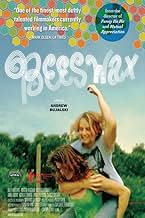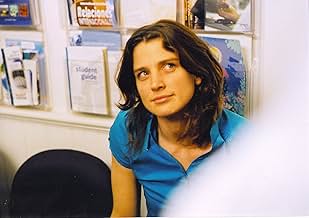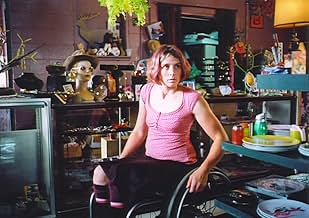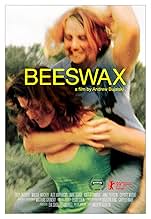A pair of identical twin sisters -- one, who has been paraplegic since youth and gets around in a wheelchair, and the other -- 'same face, different bodies.'A pair of identical twin sisters -- one, who has been paraplegic since youth and gets around in a wheelchair, and the other -- 'same face, different bodies.'A pair of identical twin sisters -- one, who has been paraplegic since youth and gets around in a wheelchair, and the other -- 'same face, different bodies.'
- Awards
- 1 nomination total
- Director
- Writer
- All cast & crew
- Production, box office & more at IMDbPro
Featured reviews
An earlier reviewer, Dom-Donald, wrote: "There were no developed characters, there was no plot, no beginning, middle or end. There were no interesting relationships, no questions asked of the audience, no explorations of ideas or emotions. There were no challenging subjects, nothing shocking or controversial. Nothing actually even happened, so there were no events for the characters to even discuss. Even the relationship between the two sisters wasn't explored in any way.
"The movie just started and then a bit later it finished at some random point (the camera ran out of film?) .... I challenge you to watch it, for that is probably the only valid reason for doing so!"
I accepted his challenge. He is right. The movie would have been better had they run out of film earlier. In fact the earlier the film ran out, the better it would have been.
Another reviewer, Mike Mellon, wrote: "I'm having a hard time believing it was actually written instead of made up as the filming progressed. Pass on it, and instead, go eavesdrop on a random stranger's conversation. You will get the same experience."
Mike is on the right track, but is not quite correct. I eavesdropped on some customers at a 99 Cents Store to test his theory. It was not the same experience. My experience at the 99 Cents Store was more entertaining and the strangers on whom I eavesdropped were more interesting.
The characters in Beeswax were dumber than they would have been in real life. The aspiring lawyer could not have gotten through law school without a sharper intellect than his character displays.
Like others who were disappointed in this film, I am not a consumer of mass market culture and I tend to favor the avant garde. So I don't think the people responsible for this film should have their artistic license revoked... just put on probation and be required to attend boredom management training, and make restitution. I think there are a lot of victims who want their 100 minutes back.
"The movie just started and then a bit later it finished at some random point (the camera ran out of film?) .... I challenge you to watch it, for that is probably the only valid reason for doing so!"
I accepted his challenge. He is right. The movie would have been better had they run out of film earlier. In fact the earlier the film ran out, the better it would have been.
Another reviewer, Mike Mellon, wrote: "I'm having a hard time believing it was actually written instead of made up as the filming progressed. Pass on it, and instead, go eavesdrop on a random stranger's conversation. You will get the same experience."
Mike is on the right track, but is not quite correct. I eavesdropped on some customers at a 99 Cents Store to test his theory. It was not the same experience. My experience at the 99 Cents Store was more entertaining and the strangers on whom I eavesdropped were more interesting.
The characters in Beeswax were dumber than they would have been in real life. The aspiring lawyer could not have gotten through law school without a sharper intellect than his character displays.
Like others who were disappointed in this film, I am not a consumer of mass market culture and I tend to favor the avant garde. So I don't think the people responsible for this film should have their artistic license revoked... just put on probation and be required to attend boredom management training, and make restitution. I think there are a lot of victims who want their 100 minutes back.
.... because IMDb won't let me rank it any less.
Aimlessly directed and written with a ham fist, Beeswax is a movie that relies far too much on automatic indie film credibility and too little on making a cohesive story.
I understand that this was meant to be quasi-documentary style, and film snobs might tell me that I just don't "get it" - that it's a slice of life, and that life doesn't read as smoothly as a movie script. But there's a REASON that movie scripts go smoothly: Because it's painful to watch a story like this get mired in minutia with no accountability for pacing or telling a complete tale.
The cast did the best they could with what they were given, but this plays like someone's film school project. Self-indulgent, loaded with an unwarranted confidence that greatness is unfolding, Beeswax is strictly amateur night.
Aimlessly directed and written with a ham fist, Beeswax is a movie that relies far too much on automatic indie film credibility and too little on making a cohesive story.
I understand that this was meant to be quasi-documentary style, and film snobs might tell me that I just don't "get it" - that it's a slice of life, and that life doesn't read as smoothly as a movie script. But there's a REASON that movie scripts go smoothly: Because it's painful to watch a story like this get mired in minutia with no accountability for pacing or telling a complete tale.
The cast did the best they could with what they were given, but this plays like someone's film school project. Self-indulgent, loaded with an unwarranted confidence that greatness is unfolding, Beeswax is strictly amateur night.
'Beeswax' is Andrew Bujalski's third feature film after two other independent features dealing with young,urbane 20 & 30-something hipsters (his two other feature films are 'Funny Ha,Ha' & 'Mutual Appreciation',as well as a short film,unseen by yours truly). This time,Bujalski's lens is turned to an area of Texas that may well be Austin. Two sisters,both fraternal twins,Lauren (played by Maggie Hatcher),and her wheelchair bound sister,Jeannie (Tilly Hatcher)share an apartment. Jeannie operates a vintage clothing shop that seems to be on the brink of collapse,due to the fact that Jeannie's business partner,Amanda (Anne Dodge)seems to want to drop out as a partner,but not before she decides to sue Jeannnie. Jeannie is getting very close to Lauren's ex boyfriend,Merrill (Alex Karpovsky),a would be lawyer who is just a breath away from passing his bar exam. Other characters drop in & out of this finely written & directed film (by Bujalski himself,who also wore a third hat as editor)that has to take it's time to sink under your skin to get the very real & true "fly on the wall" feel to it (the pacing is somewhat slow,but it's worth sticking with it until the end). Comparisons to the French film director,Eric Rohmer,or even John Cassavetes will be duly noted. This is a film with characters that are more real than the current dredge of cinedreck,conjured up by Hollywood...and certainly WAY more real than any of the (so called)reality TV shows that one can rot their brains on television with, can do. No MPAA rating,but contains some brief strong language & adult situations that would probably only land it a PG-13 rating if it was submitted,at the most.
Jeannie (Tilly Hatcher), a girl in a wheelchair, owns a vintage clothing store. Amanda, her business partner, is deeply unsatisfied with how she runs the business and is considering a legal battle for ownership. Merrill (Alex Karpovsky), a young law student tries to help Jeannie by offering emotional support and legal advice, as well as introducing her to potential buyers. In the meanwhile, Lauren (Maggie Hatcher), Jeannie's slacker twin sister, looks for steady work and a general direction in her aimless drifter lifestyle. Finally, a new clerk is a welcome addition to the store but things get complicated when she turns out to be a tad too sentimental.
Heralded as the King of the Mumblecore movement, Bujalski's films are uneventful "slices of life" naturalistic depictions of youth in shambles. Each story is a tragic tale of emotional teetering on the edge of madness. For this he has been compared to Cassavetes, but Bujalski's life depictions are actually sexless, unrooted, and deceptively intellectual (but not in a negative way).
His characters recede inside themselves as they attempt to grasp for an adequate language to express what might be a conditionally repressed intensity. In a sense, they are the opposite of Cassavetes' bombastic, larger than life, overexpressive characters. But his means of examination are the same: full shots of bodies, matter-of-fact depictions of communicative behavior (mannerisms, tics), faces chosen for their anti-cinematic potential, so plain that they make our expected systems of dramatic representation collapse. Along the way we discover new modes of being, and an almost ethnographic look at human presence.
Above it all, there is a kind of hidden essay on filmmaking and creativity:
The sisters are twins. ('Same face, different bodies')
The clothing store is called Storyville.
Jeannie, paralyzed from the waist down as an audience surrogate, the "sitting down" metaphor, the watcher/observer, and the "real" manager of Storyville. She's involved in a legal dispute over the ownership of the store. The differences with the other owner are creative ones.
Merrill, a law student, interested romantically in Jeannie, but also an artist, a kind of surrealist writer, always commenting on situations with non sequiturs, exaggerations, cartoonish excesses.
Lauren, the second twin, her introductory scene sees her breaking up with a "boyfriend". She appears confused, or fickle. But she's obviously a lesbian. Throughout the movie she looks for work, speculates on possible futures, hangs out with drug addicts. The closest thing to a 'drifter' character in the story. She's the quantum fulcrum. It is through her presence that everyone else can feel anchored.
Bujalski is popularly misunderstood. His desire to shoot 16mm, "small" stories and his use of first-time actors, tie him to a deeply experimental and innovative tradition of art cinema (Cassavetes, Jem Cohen, Andy Warhol, Pedro Costa). One can only hope he keeps on working without being too affected by the lack of popular approval. In my mind, he is constantly refreshing, layered, and dangerous, if you see cinema as a kind of schizophrenic simulation machine.
Heralded as the King of the Mumblecore movement, Bujalski's films are uneventful "slices of life" naturalistic depictions of youth in shambles. Each story is a tragic tale of emotional teetering on the edge of madness. For this he has been compared to Cassavetes, but Bujalski's life depictions are actually sexless, unrooted, and deceptively intellectual (but not in a negative way).
His characters recede inside themselves as they attempt to grasp for an adequate language to express what might be a conditionally repressed intensity. In a sense, they are the opposite of Cassavetes' bombastic, larger than life, overexpressive characters. But his means of examination are the same: full shots of bodies, matter-of-fact depictions of communicative behavior (mannerisms, tics), faces chosen for their anti-cinematic potential, so plain that they make our expected systems of dramatic representation collapse. Along the way we discover new modes of being, and an almost ethnographic look at human presence.
Above it all, there is a kind of hidden essay on filmmaking and creativity:
The sisters are twins. ('Same face, different bodies')
The clothing store is called Storyville.
Jeannie, paralyzed from the waist down as an audience surrogate, the "sitting down" metaphor, the watcher/observer, and the "real" manager of Storyville. She's involved in a legal dispute over the ownership of the store. The differences with the other owner are creative ones.
Merrill, a law student, interested romantically in Jeannie, but also an artist, a kind of surrealist writer, always commenting on situations with non sequiturs, exaggerations, cartoonish excesses.
Lauren, the second twin, her introductory scene sees her breaking up with a "boyfriend". She appears confused, or fickle. But she's obviously a lesbian. Throughout the movie she looks for work, speculates on possible futures, hangs out with drug addicts. The closest thing to a 'drifter' character in the story. She's the quantum fulcrum. It is through her presence that everyone else can feel anchored.
Bujalski is popularly misunderstood. His desire to shoot 16mm, "small" stories and his use of first-time actors, tie him to a deeply experimental and innovative tradition of art cinema (Cassavetes, Jem Cohen, Andy Warhol, Pedro Costa). One can only hope he keeps on working without being too affected by the lack of popular approval. In my mind, he is constantly refreshing, layered, and dangerous, if you see cinema as a kind of schizophrenic simulation machine.
I just watched this movie, and I'm not even sure what I saw should be called a movie. It's seemed more like a voyeuristic peek into the lives of some unremarkable people. Watching it felt like being a bored fly on the wall. It was slow to get going, and once it did, I felt indifferent about the plot (what plot there was). It really was no more exciting than folding my laundry, and once I did start to finally take a little interest in the characters and what was happening to them, it ended with no resolution of the conflict. The only reason I'm even giving it a 3 is because the actors are actually rather good at playing the part of average people. Then again, perhaps they weren't acting at all.
I love independent and low budget films, but the production of this one was just a waste of equipment and editing time. I'm having a hard time believing it was actually written instead of made up as the filming progressed. Pass on it, and instead, go eavesdrop on a random stranger's conversation. You will get the same experience.
I love independent and low budget films, but the production of this one was just a waste of equipment and editing time. I'm having a hard time believing it was actually written instead of made up as the filming progressed. Pass on it, and instead, go eavesdrop on a random stranger's conversation. You will get the same experience.
Did you know
- TriviaThe two leads, Maggie and Tilly Hatcher, are real life long time friends of Director Andrew Bujalski. His script was inspired by his feeling of how the sisters would project as performers (as they are not professional actors).
- SoundtracksStarlight
Written and Performed by Escort
Published by Sweet Sensation Publishing (ASCAP)
Courtesy of Escort Records
Details
Box office
- Gross US & Canada
- $46,590
- Opening weekend US & Canada
- $5,844
- Aug 9, 2009
- Gross worldwide
- $46,590
Contribute to this page
Suggest an edit or add missing content



























